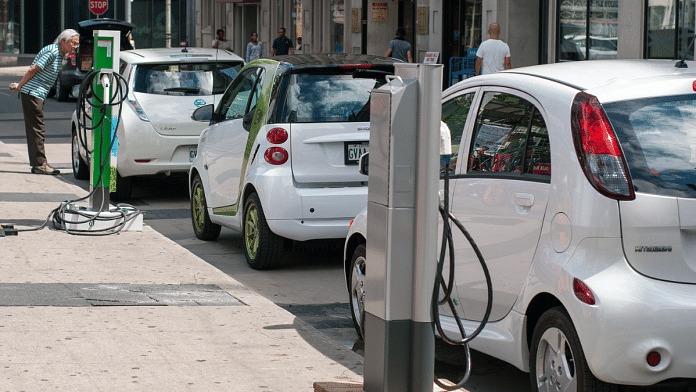Engineering without considering economics is nothing but a science project. These words by Arun Vinayak, the co-founder of Bengaluru-based startup Exponent Energy stayed with me. If you haven’t heard of this company, it is time you should. They have solved one of the biggest problems in the electric vehicle space by enabling rapid charging of vehicles in just 15 minutes every single time for more than 3,000 charge cycles. Lithium Ferro-Phosphate (LFP) cells, the most commonly-used Lithium cell chemistry for EVs nowadays can’t fast charge every time and only guarantee 1,000 charging cycles; other then Tesla few other companies in the world have managed this.
While Vinayak describes his firm as a full-stack ‘energy company’, he takes pains to make one thing clear—Exponent Energy doesn’t manufacture the cells but they do build the battery pack. And the charging unit as well, which uses a proprietary Exponent charging point. Unlike Tesla, which also makes the battery backs and their ‘Superchargers’, Vinayak tied up with commercial three-wheeler EV manufacturer Altigreen in which they install their battery packs. “We had a robust OEM manufacturing base in India, and this allowed us to stay an asset-light company,” he told me at the company’s headquarters in the leafy heart of old Bengaluru where we met far away from the glass and concrete monoliths of the tech city.
Fast charging and more
Vinayak, who also co-founded Ather Energy, admits that it was during the pandemic that his attention was drawn to the challenges in the EV space. Observing the large number of cargo three-wheelers moving around in Bengaluru during the lockdown, he saw an opportunity.
The single biggest problem with electric vehicles is that they take a long time to charge, no matter what the form factor of the vehicle or the use case. This also makes the charging ecosystem inefficient. There are a couple of reasons for this, one is the chemical processes inside each cell when higher currents are passed through them. It leads to cell degradation. The other is heat, particularly in a country like India which has very high ambient temperatures. Vinayak and his co-founders worked towards developing a Battery Management System (BMS) with virtual cell models that is able to significantly moderate cell degradation. The company has applied for 31 patents already and more are on the cards, a few should finally get approval later this year.
Then there was the part that astounded me. In advanced vehicles such as German luxury cars, the cooling system can manage the thermal cooling that batteries require as fast charging can significantly heat up batteries. Exponent Energy’s proprietary connector and charger actually pumps cold water through the battery system while charging it. “Charging is a highly stressful event for the battery and we keep it cool,” said Vinayak.
These measures have multiple impacts, according to Vinayak. In the pilot project by Exponent in Bengaluru, with over 200 vehicles deployed by both fleet and individual operators, it was observed that such vehicles covered more distance and be used longer than typical three-wheeler EVs.
“Because we are promising 15-minute rapid charging, we can fit a smaller battery pack of eight kilowatt-hours (kWh) compared to the 12-15 kWh batteries on standard cargo three-wheeler EV’s,” Vinayak said. This has two benefits. As batteries are heavy, this marginally improves load capacity but the bigger benefit is a much-reduced capital cost as batteries are the single most expensive part of EVs.
“Even from the same manufacturer on the same chassis, our EVs are cheaper by almost Rs 1 lakh because of the smaller battery. Not only is the capital cost lower but because you don’t have to waste time charging, your downtime is minimal,” Vinayak said.
He estimates that a three-wheeler freight operator using Exponent Energy’s systems can make an additional Rs 25,000 monthly. “Because we are making charging take as long as refueling, so there is the convenience of a conventional vehicle with the operating economics of an EV.”
Also read: EVs are duping you about carbon emissions. Govt should let diesel cars run longer
Towards growth
Some of you might have noticed several EV charging stations across India are in a dilapidated or damaged state, that’s because the economics of operating one don’t work. Exponent Energy, which partners with franchisees to establish charging stations, says that because of fast-charging, their franchisees can sell more energy and at a lower cost. “It costs between Rs 24-26 per unit to buy power to charge vehicles at commercial charging stations. Much of that additional cost is for the real estate and the amortisation of the charger. But because each charger’s throughput is so high, we can sell power at ₹14/unit,” Vinayak added. Exponent Energy also installs standard DC-001 chargers on all their products to give their users an option.
When manufacturing of battery packs was delayed for a few months after the government brought in the new Automotive Industry Standard (AIS) 156, the company lost some sales. But Vinayak is looking for Exponent Energy, which has already raised $18 million from a clutch of investors, to expand rapidly. A new facility should allow them to make 25,000 battery packs for three wheelers annually.
The company is also looking at the four-wheeler light commercial vehicle space, the so-called Chota Hathi segment. They already have plans to enter the inter-city bus segment. The startup is expanding to Delhi NCR in January 2024 and Mumbai, Chennai, Hyderabad and Ahmedabad by the end of 2025. Vinayak wants to take Exponent Energy nationwide and eventually across the tropical belt around the world, spanning from South-East Asia to Latin America.
The meeting rooms at Exponent Energy are named after space missions to the Moon. I met Vinayak in ‘Apollo 11’ and while leaving he mentioned about naming one room ‘Chandrayaan 3’ now. As I was about to leave, he said, “Build in India is a global good.”
@kushanmitra is an automotive journalist based in New Delhi. Views are personal.
(Edited by Anurag Chaubey)



